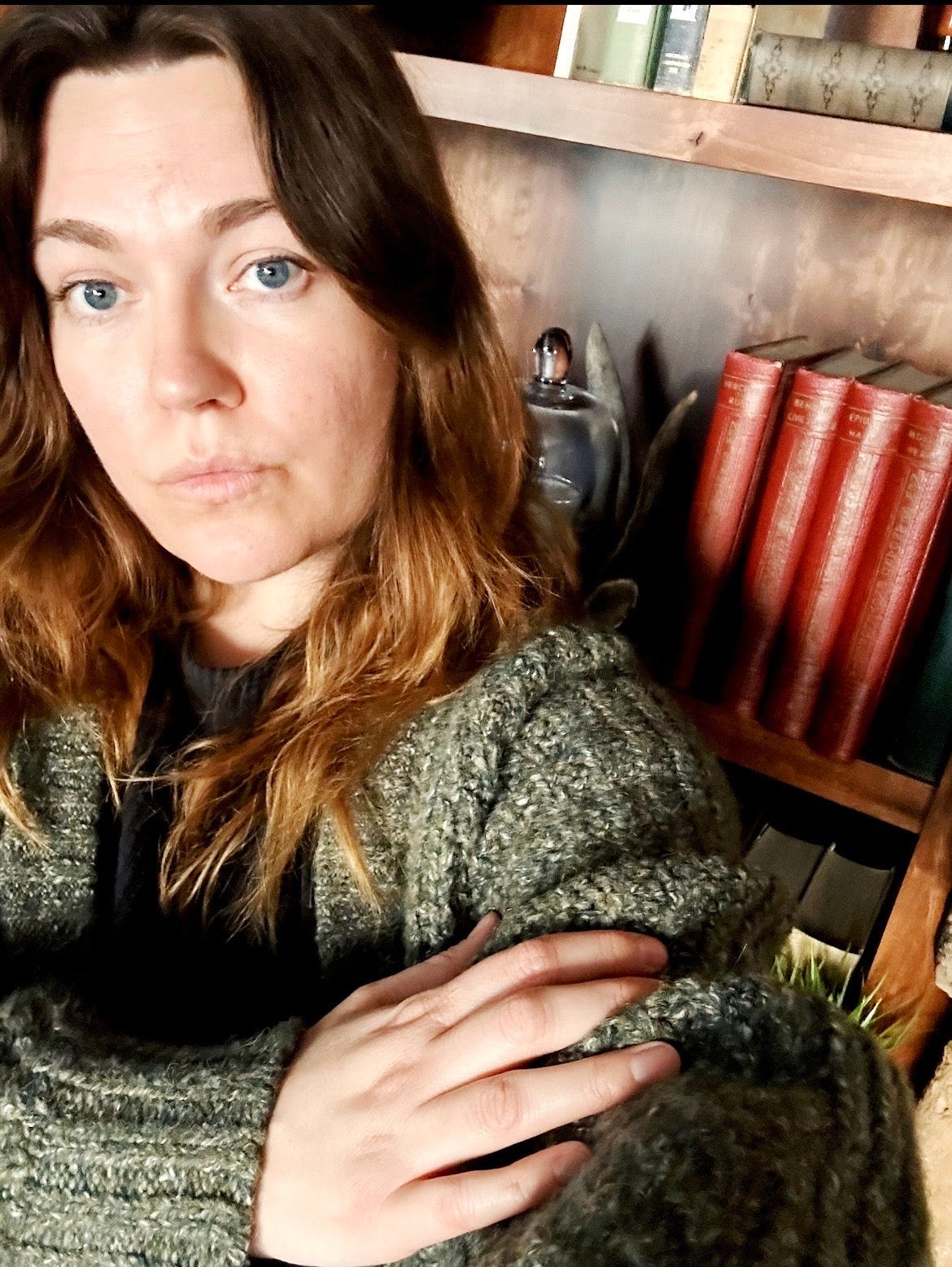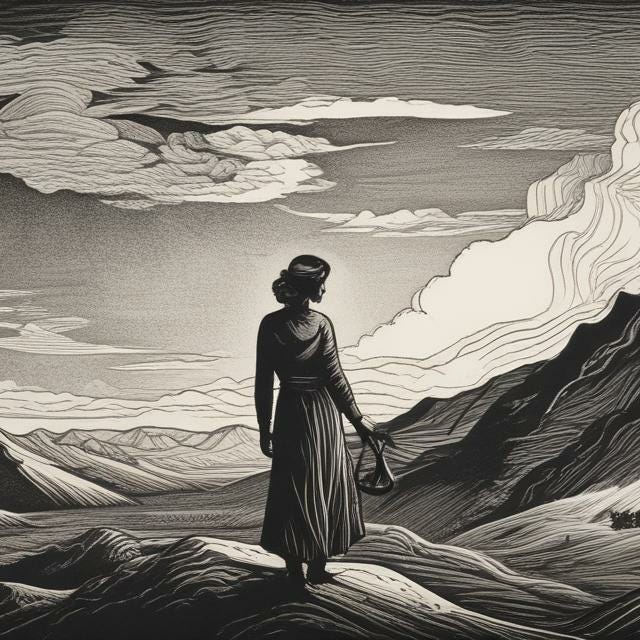Human/Parents Interview: Ariane Elizabeth Scholl and Birth Trauma
Human/Mother welcomes Substack author of --esque!
Human/Parents is an interview series that explores and illuminates various mental health topics that some parents face while simultaneously performing the most important job on the planet: raising the next generation. Guests are Substack creatives who are also parents dealing with one or more of Human/Mother’s rotating monthly mental health topics.
This month’s topic is birth trauma.
So, pour yourself that third cup of coffee, snuggle in, get cozy, and get ready to meet our next guest:
from !Tell us about yourself and your Substack. How did you find writing, or, maybe, rather, how did writing find you? What led you to start —esque? What is your newsletter’s goal?
Thank you so much for having me. I’m honored to be your guest! I am a writer and the founder and co-owner of Hearth & Hammer, a literary candle studio and general store. I live outside of Chicago with my design director husband and our seven-year-old daughter.
I’ve been writing for as long as I can remember. I’ve always kept notebooks and journals. In my teens and twenties, I kept online journals like Livejournal and Greatestjournal. I had a couple friends start a newsletter on Substack and after subscribing to those I realized Substack is essentially the grown up version of Livejournal and was instantly hooked.
The creation of —esque stemmed from wanting a creative outlet: a place where my writing could live and that I could share what I was working on alongside my journey of trying to become a published writer. I gave it a large container to exist within, which I know is the opposite of what anyone will tell you to do if you’re trying to make a viral newsletter. People are screaming all over notes to niche down, but I have no desire to niche down. I don’t want to be singular. I want to write whatever I want to write.
As for goals for —esque, the only true goal is to share my work with people who enjoy it. To create connections with other people and have a space where my creativity can run rampant and not be dictated by algorithms.
Let’s cut to the chase and get into your birth trauma experience. To the extent you’re comfortable, would you please share your story with us?
In 2017, my daughter was born via an emergency c-section after ten hours of laboring unmedicated. I knew birth would be hard. I was under no delusion that it was going to be pain-free or easy, but I did hope that my mother’s ability to give birth to eight children vaginally, followed by my sister's four, would mean that I too would give birth vaginally. Something in the back of my head kept nagging at me though the weeks leading up to my daughter’s birth. I was worried I would need a c-section.
The first time I ever needed to be at the hospital following my own birth was for the birth of my daughter. I had never broken a bone, never needed any kind of surgery. Prior to my labor, I had been lucky to never need medical intervention whatsoever. Which is why, after ten hours of laboring unmedicated, when my midwife suggested I get an epidural and try to rest a bit before continuing to push, I was incredibly anxious about having a needle inserted into the space surrounding my spinal nerves.
As I leaned forward, the curve of my back facing the anesthesiologist, the largest, most painful contractions ricocheted through my body. “You have to hold still,” the man said, as pain rocked my body, threatening to split me in half. I was already dilated to ten—the contractions at their strongest. It was nearly impossible to hold still, but I knew what was at stake: the needle puncturing my spinal cord and potentially causing paralysis. I gritted my teeth and held still and once the epidural was active, I was shocked by how I could feel nothing. So much nothingness. The monitors showed that a contraction was coming, but the sensation was blank.
I tried pushing more until I was told my daughter’s heart rate was faltering off and on, and they could not see her head. She had not lowered into the birth canal. It was then I was told I would need an emergency c-section.
Next thing I knew, a surgeon I had never met before came and told me what would happen. She was a positive surge of new energy. I could cry thinking of her now. “We are going to get your baby here safely,” she said. “You’ll get to meet her soon.” She reassured me that the scar would be small without my asking. I did not care about the scar at all and had the sense she had been asked about this many times before. It made me sad because I knew it was misogyny at work, doing its finest, to make even a terrified woman worry about how much a scar would lower her placement on the societal beauty scale.
They then wheeled me into the operating room. The change of light from the dim lit birthing suite to the caustic white sterile environment of the OR was jarring. They taped my hands down to my side and began shaving me. Being pulled away from my husband was scary, but after a few minutes, he was there, back by my side. His excitement to meet our daughter buoyed me.
“You won’t feel pain, but you will feel pressure,” the surgeon told me. I was not prepared for the odd sensation of your organs being moved aside while they pulled your child from your womb and into the world. It was nothing like I had imagined.
When they lowered the blue drape, there was a plastic sheeting in its place. I ripped my hand from the table and freed it from the heartbeat monitor and reached underneath the plastic to hold my daughter and everyone yelled for me to move my hand back away from the plastic sheeting. I was ruining the sterile environment and was a risk to myself. I couldn’t comprehend then how this mattered, because I didn’t understand the extent to which I had been flayed open. I had always imagined holding my naked daughter to my chest and crying with relief, feeling her tender, slick body there as proof that she had come from me. Instead, they took my daughter and wrapped her in a blanket and put a little hat on her head and then returned her to me, wiped clean of all the new, raw humanness. I was too weak to hold her. My husband held her tiny face to my cheek and I cried because I was grateful she was here and because I wanted to hold her and was too weak to do so. It wasn’t what I had pictured at all.
As they sutured me, I asked to see the placenta, wanting to see what had kept my daughter nourished all those months. My husband is squeamish and said he wanted to leave the room for the viewing. The team told him to take our daughter and leave the room. Neither of us thought through the reality that this meant my mother and sister would meet my daughter without me. No one filmed their meeting. It is still this undocumented moment that upsets me the most.
The first two days following her birth were the worst. I could barely move without sharp pain igniting from my incision and traveling through my body. It was hard to hold her, to breastfeed her. I could not get up to change her diapers. I had told my husband I would teach him how to change her diaper on the day she was born, thinking I’d be able to show him and walk him through it, but, instead, I was laid up in bed explaining the steps verbally.
As someone who is perhaps hyper self-sufficient, it was incredibly hard to feel so incompetent and incapable. I stared down at my daughter and felt like someone had handed me a stranger I didn’t know. The drugs numbed both the pain and my ability to connect with her. My body, in shock, having never been cut open.
How did the traumatic experience affect your marriage, and how did you and your partner handle that?
For the first 4-6 weeks, I was on painkillers and could not drive, so anytime I needed anything, I had to ask my husband to go and get it for me. I’ve always loved driving and longed for alone time to process my thoughts, but instead I was sequestered at home barely able to walk up our stairs.
Before I left the hospital they gave me a pamphlet that said, “Don't carry anything over ten pounds.” I laughed, holding my ten-pound daughter in my hands. It was then I knew the healing would not be easy.
The first week we were home my husband also caught the flu and in order to protect our daughter, he slept in our guest bedroom and did not come down during the day until he felt better, which meant that I had to care for a newborn barely able to walk. As she latched onto my breast, I truly understood for the first time just how strong women are. I was battered, bruised, cut open and sutured shut, and still, my body had the ability to provide sustenance for her.
In the months that followed, some resentment grew towards my husband as I realized that an equal division of labor in a house with a breastfed newborn was a cruel joke.
Over time, we fell into a rhythm. He would wake with her in the morning, wrapping her to his chest and trying to hold her off for as long as he could so I could rest. He tried to take over as many of the duties as he could before he had to go back to work and then we were thrust back into our insular world together.
I just had to keep reminding myself that we had both chosen this and he was doing the best he could. Keeping tabs on fair and equal was not going to get us anywhere.
How did the traumatic experience affect your ability to mother and bond with your child immediately after giving birth? Does it still have an effect on the relationship you have with your child? How so? And, what do you do when it shows up (or, say, you feel triggered)?
I did not immediately feel bonded to my daughter when she was born. The books said to stare at her, so that’s what I did. I stared at her for hours, and I cried looking down at her. She was so small and helpless and innocent. It was working. The love I had for her started to come to the surface like the first sprouts of green after a long winter. As she got older and started to look more like a real baby and not like a squishy, alien newborn, I started to recognize her as I imagined her to be. The first day she smiled at me, I cried. It felt like reaching a plateau after a long climb.
I am happy to say that it does not have an effect on our relationship. We have only grown closer with time. She is seven-years-old now, and sometimes I cry looking at her through the rearview window of our car aftering we pick up boba teas and listen to Gracie Abrams or Chappell Roan or her new favorite, “Wagon Wheel,” introduced to her by her teacher. She’s so smart and funny and creative and opinionated and hanging out with her has become more fun than taxing. I love seven. Seven feels good. Recently I told her I was stressed waiting to hear if I got into a writer’s workshop and she said, “I know, I know, you’re always waiting to hear back about something. Just try not to think about it all the time.” I laughed. When had she become so observant and wise?
Could you share with us some ways you’ve found to cope with the experience? How are you finding healing? Do you have any specific resources to share with our readers?
Well, as a writer, I wrote down my experience—first, through a poetry collection, and then through a fictionalized manuscript. In many ways, I am still healing, largely from the picturesque lie that women are sold about how our bodies are made for birth, how easy it can be, and how our first days with our baby will be bathed in some kind of golden light. Birth is messy. Birth is beautiful. Birth is brutal and painful and ugly. We all go into our first birth with a certain kind of naivete, otherwise I don’t think we would ever do it.
Some novels that I’ve read and have made me feel far less alone in the messy reality of motherhood are:
Thank you so much for being vulnerable and sharing an important piece of your motherhood story with us, Ariane! I’m excited to check out the books you mentioned here and look forward to reading your own beautiful words over on
!If you or someone you know has experienced a traumatic birth, please consider sharing this post, commenting, or tapping that heart below. Tell us your story, offer any advice or wisdom gained through your own personal experience, and/or let us know which details of Ariane’s story you found relatable, helpful, or hopeful.
Wherever you are in your journey, know that you deserve peace, hope, and love.








Thank you for giving me space to tell my story, Katrina! ❤️
Loved reading this. I’ll come back to comment more when I’m able!